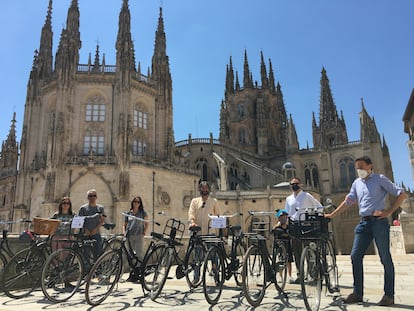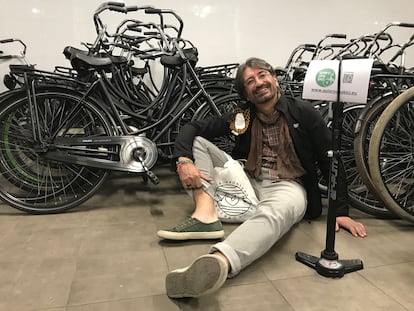Abandoned Dutch bikes get a second shot at life in Spain
Spanish cycling enthusiasts have launched Quierounabici.eu, an initiative that imports Amsterdam-style bicycles to their home country


Cities in the Netherlands are crowded with bikes that have no gears and are ideal for riding on flat streets. Everywhere you look, there are bikes trundling alongside the sides of roads and parked in every conceivable corner. It is a cyclist’s mecca but the flip side is that many of the bikes end up abandoned, a problem the Dutch authorities have to deal with.
During the coronavirus pandemic, David Saiz and Ana Castán, two Spanish cycling enthusiasts, became aware that the Covid-19 restrictions were causing a shortage of cheap bicycles in Spain due to a meteoric boom in sales in the second-hand market. According to José Luis Martínez, the owner of second-hand bicycle business Recycling Madrid, the reasons for this were threefold: “First, the fear of taking public transportation; second, shopping malls have been closed, so it has not been possible to buy new bikes there; and third, people were allowed to play sport, but since you cannot do team sports, most have opted for running and cycling,” he told EL PAÍS last summer.
Good news for Saiz and Castán, who have launched a collaborative project to plug the gap in the market and resurrect the abandoned Dutch bikes in Spain. Last October, they imported 130 such bikes to sell at an affordable price and are preparing their second shipment for this summer.
“After the lockdown, we noticed there was enthusiasm and a boom in cycling, but also a shortage of bikes in Spain, especially cheaper ones,” says Saiz. “We were thinking about how we could fill the cities with bikes, because we know that Spain still lags behind Europe in terms of sustainable mobility, and wanted to do our bit.”

According to Ana Castán, who organizes pedal-powered tours in Amsterdam, “We were horrified to think that people wanted to get around by bike just when there were no bikes and the stores were out of stock. In Amsterdam, there’s a giant second-hand market, so we had a light-bulb moment.”
Castán asked around and discovered that Dutch municipalities collect abandoned bikes, take them to a depot and then sell them to large distributors. Together, she and Saiz decided they could start importing them to Spain and their Quierounabici.eu brainchild was born.
The first step was to set up the website and convince at least 100 people to buy as this is the minimum number of abandoned bikes the Dutch depots sell. Last October, demand exceeded expectations: 130 interested parties put down the €30 to reserve a bike. The pair then trucked the bikes over to several Spanish cities and sold each bike for €165, including transport. “It’s a very affordable price because this type of bike usually costs about €190 in Amsterdam,” says Castán.
According to Saiz, the project has several facets. “On the one hand, we want to encourage the use of bicycles in Spain, which is still way behind in cycling mobility,” he says. “Everyone thinks of Holland, where people use bikes to move around, as something quaint, but in reality it’s colder and rains more there. It would be much easier here. It’s also a circular economy project – instead of throwing away these vehicles, which are no longer used but have a long history, they are recycled and get to have a new life.”
Community spirit
Saiz adds that they also wanted to create a sense of community. “People trust us and put down €30 for the bikes, although they may later decide not to buy them,” he says. So far so good; the customers, according to Saiz, appear to be happy with their purchase. “We have even held meetings with them; the last one was in Burgos.”
Meanwhile, Castán explains that it is all about creating a cycling culture. “We want the bicycle to be seen as a way of getting around, not as a sport, and we think the Dutch bike is perfect for that, because you maintain an upright position while riding it so you don’t get back pain, and it gives you a better view of your surroundings to deal with traffic,” she says. “Since it has no gears, you don’t need to know much to fix it. The only thing that can happen is a flat tire. And its aesthetics don’t attract attention, so it’s not a go-to for thieves, making it less of a problem to park outside; it’s not like a thousand-euro bike that you don’t want to take out of the house in case it gets stolen.”
Given they have no gears, these Dutch bikes are ideal for flat cities. The first shipment was distributed between Valladolid, Burgos, Valencia and the slightly hillier Madrid. The second shipment will be distributed this summer among these four cities and also Logroño, the capital of La Rioja region. “We want to fill cities with bicycles, so they are more human, more inhabitable and more beautiful,” says Saiz. “And besides, these kind of bikes are very cool. I bought two of them.”
English version by Heather Galloway.
Tu suscripción se está usando en otro dispositivo
¿Quieres añadir otro usuario a tu suscripción?
Si continúas leyendo en este dispositivo, no se podrá leer en el otro.
FlechaTu suscripción se está usando en otro dispositivo y solo puedes acceder a EL PAÍS desde un dispositivo a la vez.
Si quieres compartir tu cuenta, cambia tu suscripción a la modalidad Premium, así podrás añadir otro usuario. Cada uno accederá con su propia cuenta de email, lo que os permitirá personalizar vuestra experiencia en EL PAÍS.
¿Tienes una suscripción de empresa? Accede aquí para contratar más cuentas.
En el caso de no saber quién está usando tu cuenta, te recomendamos cambiar tu contraseña aquí.
Si decides continuar compartiendo tu cuenta, este mensaje se mostrará en tu dispositivo y en el de la otra persona que está usando tu cuenta de forma indefinida, afectando a tu experiencia de lectura. Puedes consultar aquí los términos y condiciones de la suscripción digital.








































